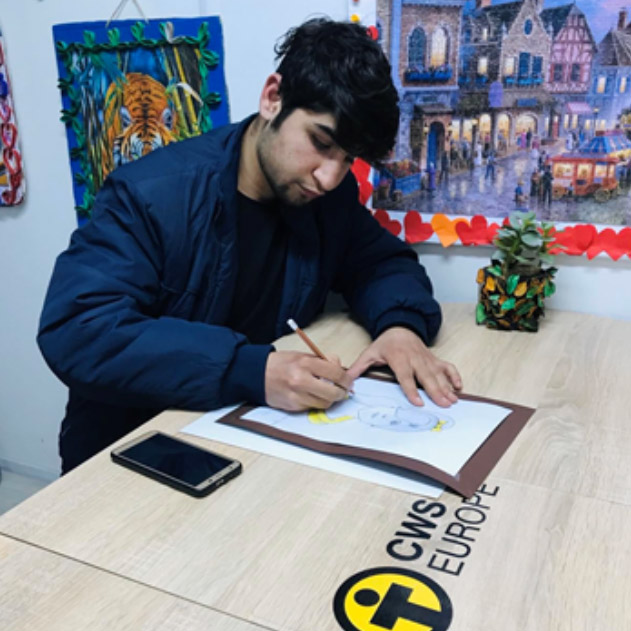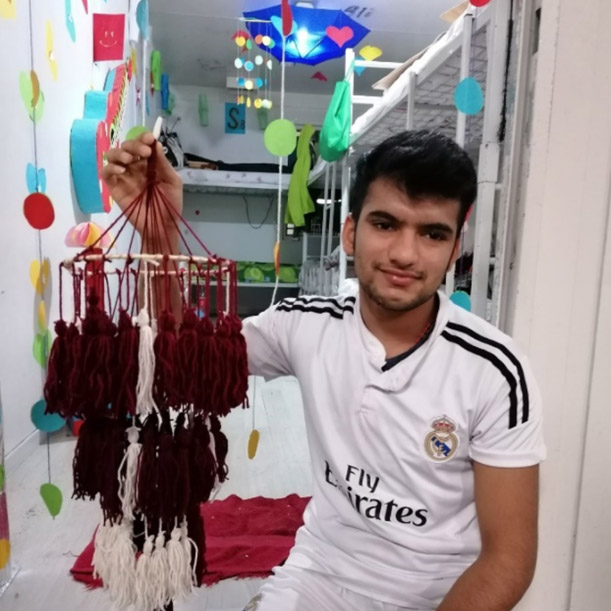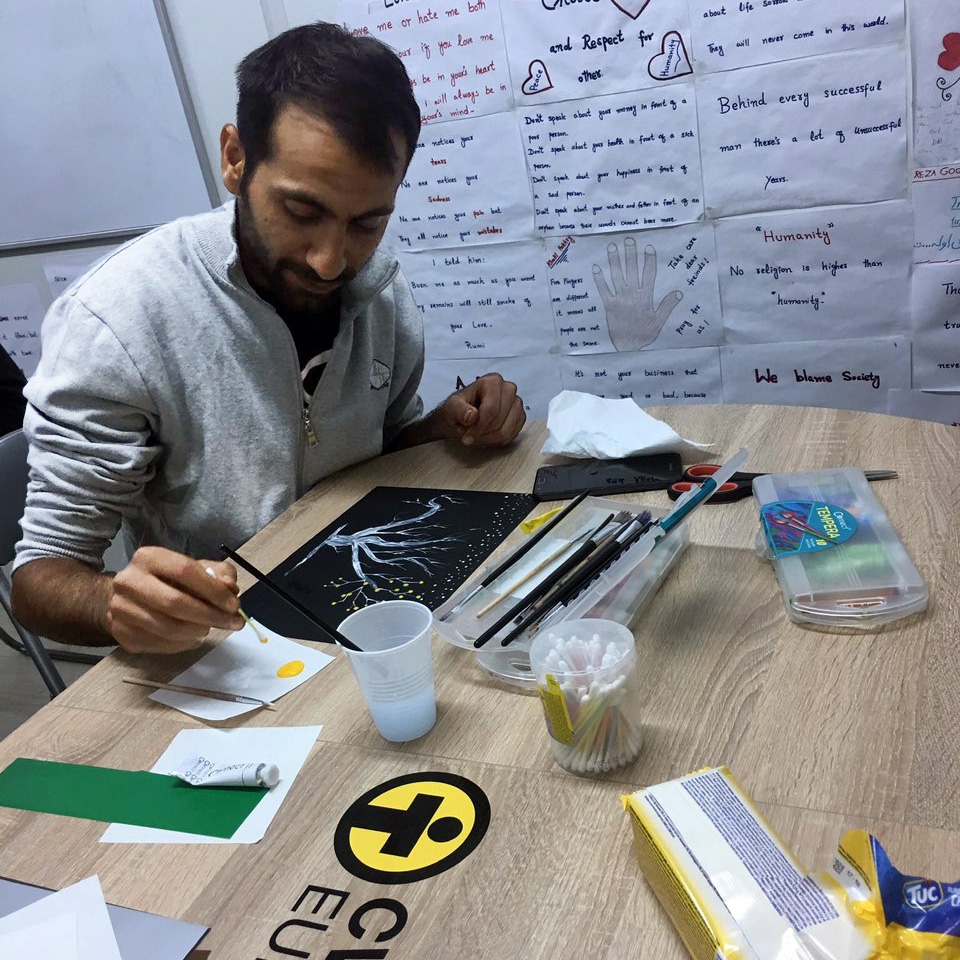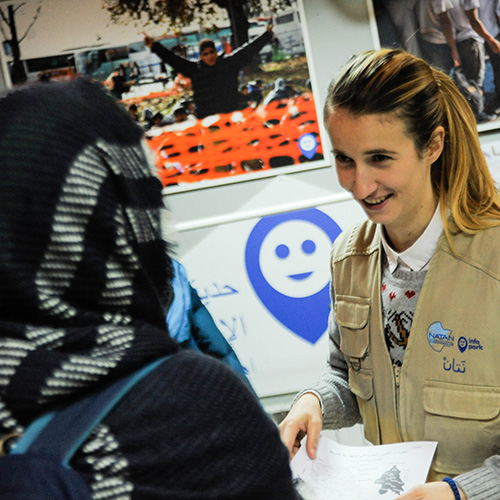As Serbia becomes an increasingly crucial waypoint for refugees and migrants—including those fleeing Ukraine—urgent challenges such as lack of shelter, healthcare, and legal protections continue to put thousands at risk. With limited institutional support and growing migration complexities, CWS and its partners are stepping in to provide emergency relief, legal aid, and long-term solutions to help displaced individuals find safety, …
The Arrival That Brought Back Memories
Abdi Iftin | November 1, 2022
The long-awaited day was here for the Eritrean family. Our CWS team gathered at the curb of a small airport in Lancaster, Pennsylvania. We scanned the horizon for a van that would be bringing our newly arrived clients, who had landed in Washington D.C. just a few hours earlier. I have not had the opportunity to welcome newly arrived refugees …
From Migrant to Helper: Adel’s Story
Lamia Topic | January 5, 2022
“I arrived in Bosnia and Herzegovina three years ago. The road took me through all of Bosnia and Herzegovina, to finally reach Bihac. I didn’t know the language; I didn’t even know where I was. At the bus stop, I listened to other people’s conversations, people like me and my at a time seven-year-old son. Passengers. Refugees. Migrants. I heard …
Migrant centers in Bosnia: the situation is untenable
February 11, 2021
Note: This article was originally published in a newsletter by ACT Alliance. It is republished with their permission. ———————————————- Bosnia saw a spike in new migrant and refugee arrivals in 2018. However, in 2020 the situation has escalated. Many migrants, including children, have been forced to live in outside makeshift settlements facing the harsh winter. Jovana Savic, CWS’s Regional Coordinator …
Stories of Change

Ghulam at work in the CWS container.
In the Midst of a Long Journey, a Moment for Inspiration
Note: This story was written in September 2020. On September 30, the Bosnian government closed the Bira reception center. CWS now works in Lipa, a new refugee and migrant center about 12 miles from Bihac. Ghulam left Bira days before the center closed.
Ghulam has been moving for as long as he can remember. He was born in Afghanistan. When he was 5 years old, his parents sent him to live with an uncle in Pakistan and start school. After a couple of years, his family joined him. Then his dad went to Saudi Arabia in search of work that would put food on his family’s table. Ghulam moved back to Afghanistan with his mom and nine siblings.
Ghulam has always loved both learning and art. He remembers racing home from school to finish his homework. Ironically, considering that he now dreams of being a professional athlete, he would paint while the other children played. When his family moved back to Afghanistan, he had to drop out of school and help earn money, but he still found a way to pursue a craft. He made wooden furniture with his older brother.
A year ago, everything changed. Ghulam’s father returned home with a medical condition that meant that he could no longer do hard, physical work. Ghulam made the tough decision that he felt was best for his family: he left to try to get to Europe and earn money that he could send back to his family. His journey has taken him through Iran, Turkey, Greece, Macedonia, Serbia and now Bosnia and Herzegovina. He desperately misses his siblings, especially his older sister. And for now, he got separated from his best friend and traveling companion, who is waiting for him in Belgium. They want to meet up and eventually go to the United Kingdom together.
For now, Ghulam is in the Bira reception center in Bihac, Bosnia. The center is full of shipping containers that are used as dormitories, classrooms and meeting spaces. CWS has a container where we offer classes for Bira’s residents. One day when Ghulam was passing the CWS container, our team invited him in for a German class. He says that he thought to himself, “I love languages. I already speak Pashto, Urdu, Farsi and English. Why shouldn’t I try to learn German as well?”
It turns out that the German class wasn’t the main takeaway that day, though. “I sat in the container, but the only thing I could focus on was the drawings that the CWS staff put on the walls,” he recalls. The next day he returned, and the CWS team was organizing a craft workshop to celebrate Valentine’s Day. For a while he just watched, but then he decided to join in. He drew for hours, and when he was finished, the CWS team complimented his work and hung it on the wall with the others.
“Every day you encouraged me to draw more and more and gave me crayons, paper and whatever I needed,” he says. Today, Ghulam is a regular at the CWS container. He loves to draw portraits and graphic drawings. He says he will continue to learn languages and paint in the future, even though his dream is to become a professional athlete.
As a recent conversation shows, Ghulam has a big heart and big plans. “I am happy to see my drawings among others, it inspires me,” he says. “But you guys need more decorations, especially wooden ones. I’ll make them for you. Maybe I’ll even start writing poetry, we’ll see.”
Stories of Change

Kalash with one of his creations.
When Creativity Leads to Community
Note: This story was written in September 2020. On September 30, the Bosnian government closed the Bira reception center. Residents, including Kalash, were transferred to another center called Lipa (where CWS now works). Within a few days of his move to Lipa, Kalash left, presumably to continue his journey.
Growing up in Pakistan, Kalash and his family were close. It was a normal, quiet life. “I graduated from high school. While I lived in Pakistan, I loved to play cricket and often went jogging. My family is large, with seven sisters, two brothers and my parents. Our relationships are really strong, and we lived together in a big house.”
Unfortunately, Kalash’s family struggled economically. His brother left a decade ago, frustrated by financial struggle and an uncertain future. He now lives in France. Two years ago, Kalash decided to follow his brother’s footsteps in search of a better life and to provide for his family.
From Pakistan, Kalash spent six months in Turkey and then two months in Greece. He spent a few weeks in Serbia and then made his way to Bosnia, where he is today.
Along the way, Kalash met people from different backgrounds. Some were very friendly, he says. Other times he was met with racism and discrimination. “Respect is the ability to feel someone else’s pain and to treat strangers in a normal way,” he says. “Racism is when refugees and migrants are told that they smell bad or that they are ugly and dirty.”
Kalash arrived in Bosnia last summer, and for the better part of the year he has been in the city of Bihac. He has primarily lived in the Bira reception center, where CWS works. He has tried to cross the border into Croatia five times, and failed every time. He has been beaten by the police and had his phone and money confiscated. After repeated failures, and due to the lockdowns from the COVID-19 pandemic, he has temporarily stopped trying to cross the border.
When some of his friends left Bira to try to continue their journey, they offered Kalash the living space in their shipping container. He had been living in a tent with about 100 other people, so he eagerly jumped at the chance to have a container all to himself.
During the lockdown, Kalash entertained himself by watching videos on his phone. He found himself watching videos of people making crafts. He watched more and more videos, sometimes staying up all night. He was constantly thinking about how beautiful the products ended up being, and he thought he could make something similar.
Kalash mostly kept to himself in Bira and didn’t participate in many activities. But one day he noticed the CWS container, which has a creative corner that offers crafts and art for Bira’s residents. He liked the decorations, and wanted to do something similar in his container. So he talked to our team, who let him have some of the decorations for his container.
It turns out that this was the start of a new passion. He collects materials from the camp’s recycling to turn into art, and CWS provides the glue and other supplies that need to be purchased. He used an old umbrella and paper to make a chandelier, for example. Soon, his ordinary shipping container turned into an extraordinary place to live. When he got new roommates, they loved what he had done with the container. He even won an award from the Bira manager for having the most beautiful container.
Kalash says that the respect and recognition that he has received as a result of his creativity makes him very happy. He’s something of a celebrity within Bira now. And our team is excited to see him using his time to do something productive and different. Plus, the confidence that he built as his work started getting recognized helped him feel safer and start communicating more with the others in the center. “Thank you CWS for giving us a chance to develop and improve our abilities and skills that we don’t even know we possess,” Kalash says.
Stories of Change

Mehrdad paints as part of a CWS program in Bosnia.
Finding an unexpected love of art
“Shiraz [Iran] is my city. I was born there, and I grew up there. When I would leave Shiraz, I always knew I would come back to my city. But today I’m not sure I will ever see Shiraz again,” says Mehrdad Azizi.
Mehrdad comes from a family of five children. “When I was 12 years old, my father left us,” he says. “My mother worked very hard to raise my two brothers, two sisters and me.” It wasn’t long, though, before Mehrdad realized that his mom needed help providing for the family. Despite being the second youngest child and merely a teenager, he got a job. “I became a welder. I would go to school and I would work…I became a head of our household.” He used his first paycheck to buy himself a mobile phone, and then he spent his earnings to cover household expenses for his family.
“I’ve always loved sports,” Mehrdad says. In his free time, he took up kickboxing. “That gave me an opportunity to travel and explore foreign countries. That’s how I traveled to Europe for the very first time. France. On that trip I fell in love with Europe. I returned home to Iran, but I was pretty sure that I would be back someday.”
The sense of responsibility that Mehrdad feels for his family runs deep. His older brother became a drug addict, and in a moment of crisis he set the family’s house on fire. “In the end, everybody gave up on him,”Mehrdad says. “But not me. I believed in him; I believed that he could be saved. Today is a happily married man, and he doesn’t use any kind of drugs.”
Mehrdad struggled with verbal and physical abuse from extended family members, and Europe remained a beacon of hope in his mind. In 2015, he and his cousin got visas to go to Europe. He made his first attempt in 2016, but as he was crossing into Serbia, one of his sisters called in tears and begged him to return home. Even though he had sunk significant time, effort and money into the journey, he returned to his family.
In 2018, he made his final decision. He wanted a life free of abuse where he would be treated as a human being, live normally and hopefully start a family one day. He had to get to Europe, and he wouldn’t be returning to Iran. “In Iran, I couldn’t have that life,” he says. He left with his cousin; his uncle was helping them pay for the trip. When they were crossing the border from Slovenia into Italy, his cousin got injured. “All the people from the group were telling me to go, to leave him behind,” Mehrdad says. “I was just a few kilometers away from Italy. But I couldn’t leave him. I stayed with him. Police caught us and deported us. Then another disaster struck: inflation in Iran. My uncle couldn’t help me with money. His son, my cousin, reached Europe, but I was stuck in Bosnia.”
“Now it’s been more than a year since I got to Bosnia. It was here that I discovered my love for art,” Mehrdad says. One day he came to the CWS program for migrants and refugees in Bosnia. In addition to the other program activities, Mehrdad stayed for a creative activity. “I took a paper and brush, and I started making moves with my hand. I forgot everything. In that moment, the only thing that existed in this world were that paper and brush. I was surprised by my talent. I never knew I had it. And the most important thing is that painting relaxed me. When I would start painting, I would forget all my problems and worries. So, I started coming to the CWS place regularly,” he says.
There were a couple of weeks when Mehrdad was having a really tough time. “While I was talking to the CWS team about it, they told me to come and visit them again after lunch,” Mehrdad says. When he came back, he found his paintings on display in front of the CWS program area. “They made an exhibition. I was really surprised. Everyone came to see it—staff and migrants and refugees. In that moment, I felt really happy and fulfilled. I will always be grateful to the CWS team that helped me discover my love and talent for art,” he says.
Mehrdad still plans to get to Europe. He says, “Now my goal is to reach England and to bring my mother there. I am planning to continue painting as a hobby. But maybe one day I will even become a professional artist and you will see my art in galleries. Who knows.”
CWS Launches New Program to Protect & Support Refugees & Migrants in Bosnia
June 4, 2019
In 2017, 758 refugees and migrants entered Bosnia and Herzegovina, hoping to reach western EU nations through Croatia. Since the start of 2018, the number jumped to over 23,000. As EU nations tightened their borders, Bosnia and Herzegovina became a safe haven for refugees and migrants. Most of the newly-arrived refugees and migrants are in the northwest, near the Croatian …
Stories of Change

A female staff member and client at Info Park. Photo: courtesy Info Park
104 women and girls have participated in Girls Day activities at Info Park in the last five months.
A ray of sunshine for refugee women in Serbia
Imagine an ordinary day in the life of a bright and determined 17-year-old girl. What do you think of? Is she doing her homework and working on college applications? Playing sports on her high school team? Spending time with her friends, or looking for internships?
You probably didn’t think of a refugee camp, miles from home and everything familiar to her. Sadly, that’s Fatima’s* reality. She is a bright and determined 17-year-old, but she lives with just one of her elderly parents in a refugee camp in Belgrade, Serbia. She felt like her life was frozen, in limbo at the moment that a future filled with possibilities should be unfolding in front of her.
Fatima’s story, unfortunately, is also the story of many other girls and women who have arrived in Serbia as migrants and refugees since the so-called Balkan route to Europe was activated in the summer of 2015. The number of migrants and refugees in Serbia is no longer at the peak levels it was after the route began, but their needs continue to be complex and the risks they face continue to be high. This is especially true for women and girls.
Everyone in this vulnerable population struggles to meet basic needs. The support system of family and neighbors that they once had at home is gone. They have often been preyed on by smugglers who take their life savings and don’t follow through on promises. As men feel helpless and frustrated, rates of intimate partner violence against women rise.
With all of this in mind, CWS partner Info Park began hosting Girls Days to help women and girls gain the information, skills and confidence they need to make their own decisions, advocate for themselves and build a social network of trust and support within the refugee community. On Girls Day, women and girls attend workshops on various topics like gender, human rights, health, assertive communication, gender-based violence and intimate partner violence; participate in creative workshops like jewelry making or henna; take German or English classes; and do yoga together.
Girls Day programs are offered in three locations in Serbia. In the first five months of the program, more than 100 women and girls from Afghanistan, Iraq, Iran and Somalia participated. Child care is also provided during the activities; more than 30 children accompanied their moms or sisters to Girls Day activities. Info Park has also arranged for Dignity Kits and supermarket vouchers for these women to ensure that they can control resources to meet their basic needs, which they often have to depend on male community members for. Counseling, action plans and referrals to other services are provided for survivors of gender-based violence, whether ongoing or in the past. The team has assisted survivors of early forced marriage, intimate partner violence and physical, sexual or emotional abuse.
Back to Fatima on this summer day in July. She has been attending German classes at InfoPark for a while, and she is now confidently fluent in the language. She is one of the most regular participants of Girls Day each week and is currently leading the group that helps other women organize and speak up about their current needs. She has made a plan for her future – she wants to work as a physician one day. Until that day comes, she is putting all her efforts and time in building her assets step by step to this goal.
When it comes to this not-so-ordinary 17-year-old, we’re there to give her the space and access she needs to accomplish all that she has set her mind to. As she puts it, “It feels cloudy almost every day. But when I join my friends at the workshop, it feels like here, in our small circle, sun is shining again.“
*Name changed to protect her identity.
